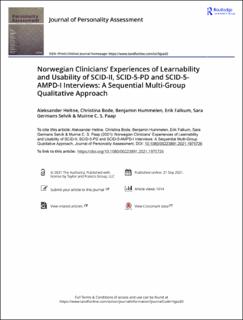Norwegian Clinicians’ Experiences of Learnability and Usability of SCID-II, SCID-5-PD and SCID-5-AMPD-I Interviews: A Sequential Multi-Group Qualitative Approach
Heltne, Aleksander; Bode, Christina; Hummelen, Benjamin; Falkum, Erik; Selvik, Sara Germans; Paap, Muirne C. S.
Peer reviewed, Journal article
Published version

Åpne
Permanent lenke
https://hdl.handle.net/11250/2976612Utgivelsesdato
2021Metadata
Vis full innførselSamlinger
- Institutt for psykisk helse [1285]
- Publikasjoner fra CRIStin - NTNU [38070]
Sammendrag
The DSM-5 presents two competing diagnostic frameworks for personality disorders: the standard categorical model and the Alternative Model of Personality Disorders (AMPD). The AMPD was initially criticized for being too complex and theory laden for clinical implementation. Though inter-rater reliability studies have contested initial claims of the model’s complexity, little attention has been paid to how clinicians experience the usability and learnability of either model. We interviewed twenty Norwegian clinicians about their experiences with either the SCID-II/5-PD (n = 9), SCID-5-AMPD-I (n = 8), or both (n = 3). Separate thematic analyses were conducted for SCID-II/5-PD and SCID-5-AMPD-I groups, and group themes were compared. We identified four themes for each group, relating to required skills, training, challenges and information gained through the interview. We found that training and clinical experience were considered to be important for both interviews. Moreover, the SCID-5-AMPD-I was considered to rely more explicitly on theory specific to the development and content of the AMPD model in general and the LPFS specifically We also identified shared and unique challenges and shortcomings of each interview. We comment on how our findings relate to the debate surrounding the AMPD, and recommend development of clear training guidelines for both interviews.
